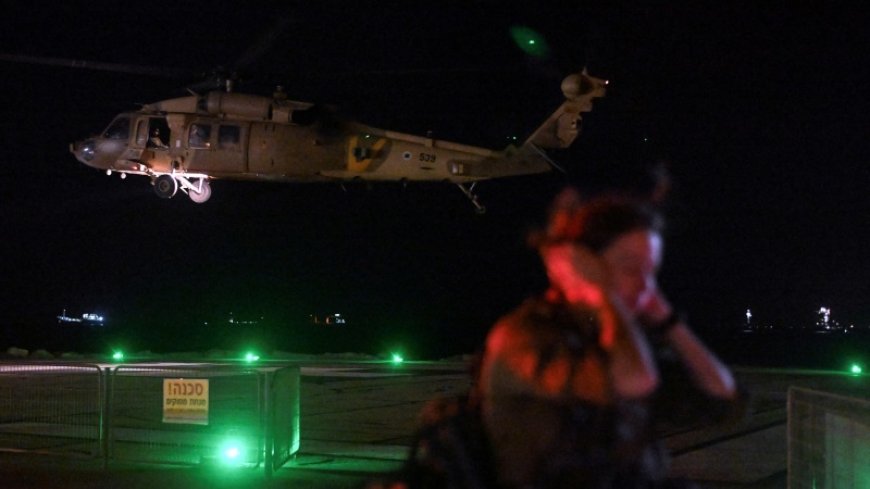The Strike by Hezbollah on Israeli Forces: A Turning Point in the War
The Israeli Defense Forces (IDF) acknowledged on Sunday that Hezbollah, the strong Lebanese organization, executed its worst attack since the war started, in a notable escalation of the continuous battle. Targeting the headquarters of Israel's elite Golani Brigade, close to Haifa, Hezbollah's anti-aircraft missile system (ATS) caused significant losses on Israeli forces. Many accounts claim that the strike marks a turning point in the confrontation between Israel and Hezbollah and shakes the whole area.

The Israeli Defense Forces (IDF) acknowledged on Sunday that Hezbollah, the strong Lebanese organization, executed its worst attack since the war started, in a notable escalation of the continuous battle. Targeting the headquarters of Israel's elite Golani Brigade, close to Haifa, Hezbollah's anti-aircraft missile system (ATS) caused significant losses on Israeli forces. Many accounts claim that the strike marks a turning point in the confrontation between Israel and Hezbollah and shakes the whole area.
Though the IDF's official count came at four dead and 67 wounded, Israeli sources claimed that hundreds of troops were killed or wounded. But because of Israel's rigorous military censorship rules, military analysts and regional observers have called doubt on these numbers. With estimates of at least 15 dead and many more injured, some sources, including Lebanon's Tasnim News Agency, citing Israeli Channel 12, imply the death toll may be far higher. There are worries the casualty count may rise as the number of critically injured keeps increasing.
Not only was the attack on the Benyamina area south of Haifa noteworthy in scope, but also in execution technique. Hezbollah allegedly avoided Israel's well-known air defense systems—including the Iron Dome, which missed the missile—by using a single drone. Given the Iron Dome's reputation as a very successful barrier against aerial attacks, this episode exposes a worrying vulnerability for Israel. Reports from Israeli media sources like as KAN indicate that the collapse of these defense systems let Hezbollah strike without setting off warning signals, therefore totally surprising the Golani Brigade.
For Hezbollah, the strike was a tactical triumph but also quite symbolic. Emphasizing that the operation was aimed to "teach the enemy a lesson" and show the militia's capacity to strike precisely at any moment, the Islamic Resistance Operations headquarters in Lebanon issued a statement following the attack. Hezbollah claimed, this operation was only a taste of the group's larger military capacity.
One cannot discount the larger background of this attack. With the Israel-Gaza war spreading over Lebanon, Hezbollah's engagement in the battle comes at a period of rising tensions throughout the area. Leader of Hezbollah, Hassan Nasrallah, has cautioned time and again that any Israeli attack on Lebanon would be greeted with harsh reprisals. The attack Sunday seemed to be a clear expression of that commitment.
Simultaneously, the continuous fighting has already caused great suffering to the Palestinian people. Over 42,000 Palestinians have been murdered and almost 100,000 more have been injured in Gaza under Israeli airstrikes within the past year. As civilian infrastructure has been destroyed and hundreds of families displaced and medical institutions overwhelmed by the unrelenting bombardments, the humanitarian catastrophe in the area has escalated.
Israel finds itself in a vulnerable state currently. Although it has aimed to confine the strife in Gaza, Hezbollah's offensive emphasizes the possibility of a more general regional war whereby Lebanon could become a second front. Maintaining operations in Gaza while strengthening its northern defenses against more Hezbollah strikes presents the IDF's double dilemma presently.
The world community is keenly observing as the crisis rages on and demands for diplomatic resolutions and cease-fires get more vociferous. On the ground, however, both sides seem resolved to keep on, laying the groundwork for perhaps even more lengthy and lethal warfare.
The whole effect of Hezbollah's strike on the Golani Brigade will probably become more evident in the next days. One thing is certain, though: this attack marks a turning moment in the war since Hezbollah proves that it is still a strong force competent of penetrating far into Israeli territory. Israel's reaction to this provocation might determine the course of the war for next weeks and months.













































